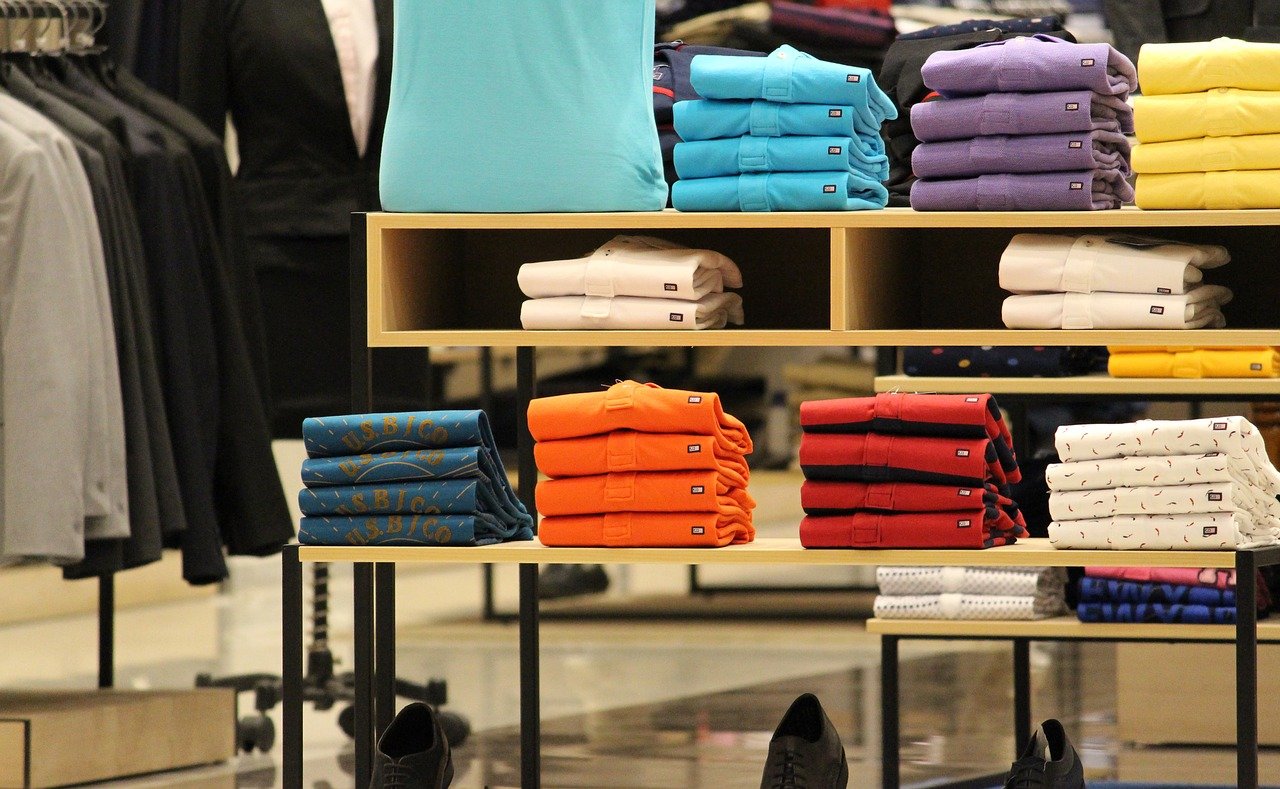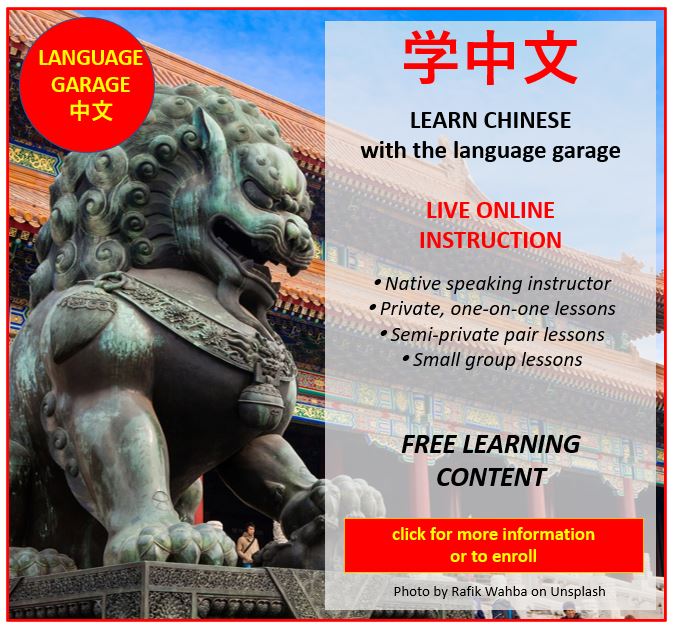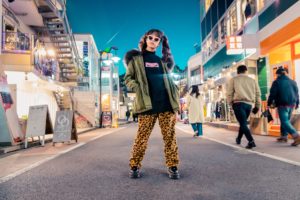Image: Ranjatm on Pixabay
In this post we’ll talk about clothing in Chinese.
我穿着一件黑色的衬衫。 Wǒ chuān zhe yí jiàn hēisè de chènshān. I’m wearing a black shirt.
Let’s start with the basics: 衣服 yīfú (clothes); 一件衬衫 yí jiàn chènshān (a shirt); 裤子 kùzi (pants); 牛仔裤 niúzǎikù (jeans); 一件 T 恤 yí jiàn T xù (a tee shirt); 腰带 yāodài (a belt); 穿 chuān (to wear); 穿衣服 chuān yīfú (to get dressed); 脱掉衣服 tuō diào yīfú (to get undressed); 穿衬衫 chuān chènshān (to put on a shirt), 脱掉衬衫 tuō diào chènshān (to take off a shirt).
- 我穿着一件白衬衫。
Wǒ chuān zhe yí jiàn bái chènshān.
I’m wearing a white shirt. - 我周末总是穿牛仔裤。
Wǒ zhōumò zǒng shì chuān niúzǎikù.
I always wear jeans on the weekend. - 我穿着牛仔裤和 T 恤。
Wǒ chuān zhe niúzǎikù hé T xù.
I’m wearing jeans and a tee shirt.
- 这条牛仔裤太大了。我需要一条腰带。
Zhè tiáo niúzǎikù tài dàle. Wǒ xūyào yìtiáo yāodài.
These jeans are too big. I need a belt. - 我在穿衬衫。
Wǒ zài chuān chènshān.
I’m putting on a shirt. - 我在脱掉我的牛仔裤。
Wǒ zài tuō diào wǒ de niúzǎikù.
I’m taking off my jeans. - 我每天早上穿好衣服。
Wǒ měitiān zǎoshang chuān hǎo yīfú.
I get dressed every morning. - 我在睡觉前脱掉衣服。
Wǒ zài shuìjiào qián tuō diào yīfú.
I take my clothes off before bed.
那是件漂亮的衬衫。 Nà shì jiàn piàoliang de chènshān. That’s a nice blouse.
Now let’s look at some more vocabulary for less casual clothing: 一件衣服 yí jiàn yīfú (a dress); 裙子 qúnzi (a skirt); 衬衫 chènshān (a blouse); 男人的西装 nánrén de xīzhuāng (a man’s suit); 女装 nǚ zhuāng (a woman’s suit); 一条领带 yì tiáo lǐngdài (a tie); 西装外套 xīzhuāng wàitào (a suit jacket); 燕尾服 yànwěifú (a tuxedo); 一件婚纱 yí jiàn hūnshā (a wedding dress).
- 她在工作时通常穿裙子和衬衫。
Tā zài gōngzuò shí tōngcháng chuān qúnzi hé chènshān.
She usually wears a skirt and a blouse at work. - 她穿着黑色裙子和白色衬衫。
Tā chuān zhe hēisè qúnzi hé báisè chènshān.
She’s wearing a black skirt and a white blouse. - 他在工作时通常穿西装打领带。
Tā zài gōngzuò shí tōngcháng chuān xīzhuāng dǎ lǐngdài.
He usually wears a suit and tie at work. - 她的红裙子很漂亮。
Tā de hóng qúnzi hěn piàoliang.
Her red dress is beautiful. - 他有很多蓝色西装。
Tā yǒu hěnduō lán sè xīzhuāng.
He has a lot of blue suits. - 这是一个正式的活动,所以他穿着燕尾服。
Zhè shì yíge zhèngshì de huódòng, suǒyǐ tā chuān zhe yànwěifú.
It’s a formal event, so he’s wearing a tuxedo. - 新娘穿着漂亮的婚纱。
Xīnniáng chuān zhe piàoliang de hūnshā.
The bride is wearing a beautiful wedding dress. - 那件夹克你打算配什么颜色的领带?
Nà jiàn jiákè nǐ dǎsuàn pèi shénme yánsè de lǐngdài?
What color tie are you going to wear with that jacket?
很冷!我穿着毛衣。 Hěn lěng! Wǒ chuān zhe máoyī. It’s cold! I’m wearing a sweater.
Now let’s look at some clothing you may wear when it’s cold: 一件毛衣 yí jiàn máoyī (a sweater); 运动衫 yùndòng shān (a sweatshirt); 一件外套 yí jiàn wàitào (a coat); 一件夹克 yí jiàn jiákè (a jacket); 手套 shǒutào (gloves); 连指手套 lián zhǐ shǒutào (mittens); 一条围巾 yì tiáo wéijīn (a scarf); 一顶帽子 yì dǐng màozi (a hat); 一件雨衣 yí jiàn yǔyī (a raincoat); 一把雨伞 yì bǎ yǔsǎn (an umbrella); 一件连帽衫 yí jiàn liánmàoshān (a hoodie).
- 冷的时候我穿上毛衣。
Lěng de shíhòu wǒ chuān máoyī.
I put on a sweater when it’s chilly. - 我可以借一件连帽衫吗?
Wǒ kěyǐ jí yí jiàn liánmàoshān ma?
Can I borrow a hoodie? - 我要带我的夹克。今晚可能会很冷。
Wǒ yào dài wǒ de jiákè. Jīn wǎn kěnéng huì hěn lěng.
I’m going to bring my jacket. It may be chilly tonight. - 他总是穿着牛仔夹克/皮衣/机车夹克。
Tā zǒng shì chuān zhe niúzǎi jiákè/pí yī/jīchē jiákè.
He always wears a jeans jacket / a leather jacket / a motorcycle jacket. - 天冷的时候我会穿外套、帽子和围巾。
Tiān lěng de shíhòu wǒ huì chuān wàitào, màozi hé wéijīn.
I wear a coat, a hat, and a scarf when it’s cold. - 不要忘记你的手套/连指手套。
Bùyào wàngjì nǐ de shǒutào/lián zhǐ shǒutào.
Don’t forget your gloves/mittens. - 你今天需要一顶帽子。
Nǐ jīntiān xūyào yī dǐng màozi.
You need a hat today. - 我的公寓很冷,所以我穿着运动衫。
Wǒ de gōngyù hěn lěng, suǒyǐ wǒ chuān zhe yùndòng shān.
It’s cold in my apartment, so I’m wearing a sweatshirt. - 下雨了,但我没有带伞。
Xià yǔle, dàn wǒ méiyǒu dài sǎn.
It’s raining, but I don’t have my umbrella. - 我今天要穿雨衣。
Wǒ jīntiān yào chuān yǔyī.
I’m going to wear a raincoat today.
很热!我穿着短裤。 Hěn rè! Wǒ chuān zhe duǎnkù. It’s hot! I’m wearing shorts.
When the weather is hot, you probably want to know how to say: 短裤 duǎnkù (shorts); 泳衣 yǒngyī (a bathing suit); 泳裤 yǒng kù (swimming trunks); 比基尼 bǐjīní (a bikini); 背心 bèixīn (a tank top); 太阳眼镜 tàiyáng yǎnjìng (sunglasses); 一顶棒球帽 yī dǐng bàngqiú mào (a baseball cap).
- 今天真的很热,所以我穿了短裤。
Jīntiān zhēn de hěn rè, suǒyǐ wǒ chuān zhe duǎnkù.
It’s really hot today, so I’m wearing shorts. - 我去海滩/游泳池时穿泳衣。
Wǒ qù hǎitān/yóuyǒngchí shí chuān yǒngyī.
I put on a bathing suit when I go to the beach/pool. - 他穿着泳裤,她穿着比基尼。
Tā chuān zhe yǒng kù, tā chuān zhe bǐjīní.
He’s wearing swimming trunks, and she’s wearing a bikini. - 夏天他总是穿背心。
Xiàtiān tā zǒng shì chuān bèixīn.
He always wears tank tops in the summer. - 天气晴朗。你需要你的太阳眼镜吗?
Tiānqì qínglǎng. Nǐ xūyào nǐ de tàiyáng yǎnjìng ma?
It’s sunny. Do you need your sunglasses? - 我总是戴着棒球帽。
Wǒ zǒng shì dàizhe bàngqiú mào.
I always wear a baseball cap.
我需要新鞋。 Wǒ xūyào xīn xié. I need new shoes.
Now let’s look at some footwear: 鞋 xié (shoes); 袜子 wàzi (socks); 运动鞋 yùndòng xié (sneakers); 凉鞋 liángxié (sandals); 人字拖 rén zì tuō (flip-flops); 靴子 xuēzi (boots); 拖鞋 tuōxié (slippers); 跟鞋 gēnxié (heels); 高跟鞋 gāogēnxié (high heels); 鞋带 xié dài (shoe laces).
- 他穿着黑色皮鞋。
Tā chuān zhe hēisè píxié.
He’s wearing black leather shoes. - 她通常穿高跟鞋上班。
Tā tōngcháng chuān gāogēnxié shàngbān.
She usually wears heels to work. - 我周末总是穿运动鞋。
Wǒ zhōumò zǒng shì chuān yùndòng xié.
I always wear sneakers on the weekend. - 我在海滩上穿人字拖。
Wǒ zài hǎitān shàng chuān rén zì tuō.
I wear flip-flops at the beach. - 我通常在夏天穿凉鞋。
Wǒ tōngcháng zài xiàtiān chuān liángxié.
I usually wear sandals in the summer. - 请在屋内脱鞋穿上拖鞋。
Qǐng zài wū nèi tuōxié chuān shàng tuō xié.
Please take your shoes off and put on slippers in the house. - 下雪的时候我穿靴子。
Xià xuě de shíhòu wǒ chuān xuēzi.
I wear boots when it’s snowing. - 穿上你的运动鞋,我们去打篮球吧。
Chuān nǐ de yùndòng xié, wǒmen qù dǎ lánqiú ba.
Put on your sneakers and let’s go play basketball. - 小心!你的鞋带解开了。
Xiǎo xīn! Nǐ de xié dài jiě kāile.
Be careful! Your shoe laces are untied.
内衣 nèiyī Underwear
Now let’s look at vocabulary for what you wear under everything else: 内衣 nèiyī (underwear); 内裤 nèikù (underpants); 汗衫 hànshān (an undershirt); 拳击手 quánjí shǒu (boxers); 内裤 nèikù (panties); 胸罩 xiōngzhào (a bra).
- 我需要买新内衣。
Wǒ xū yāo mǎi xīn nèiyī.
I need to buy new underwear. - 我要洗衣服,我没有干净的内裤。
Wǒ yào xǐ yīfú, wǒ méiyǒu qiánjìng de nèikù.
I need to do laundry, I don’t have any clean underpants. - 她穿着胸罩和内裤。
Tā chuān zhe xiōngzhào hé nèikù.
She wears a bra and panties. - 他总是穿着四角裤。
Tā zǒng shì chuān zhe sìjiǎokù.
He always wears boxers. - 我穿着四角裤和汗衫睡觉。
Wǒ chuān zhe sìjiǎokù hé hànshān shuìjiào.
I sleep in boxers and an undershirt.
这件衬衫太小了。 Zhè jiàn chènshān tài xiǎole. This shirt is too small.
Here’s some vocabulary that you can use to talk about clothing:
- 你穿多大的鞋?
Nǐ chuān duōdà de xié?
What size shoe do you wear? - 你穿小号、中号、大号还是特大号?
Nǐ chuān xiǎo hào, zhōng hào, dà hào háishì tèdà hào?
Do you wear a small, a medium, a large, or an extra large? - 这件衬衫太大/太小/太紧/太松。
Zhè jiàn chènshān tài dà/tài xiǎo/tài jǐn/tài sōng.
This shirt is too big/small/tight/loose. - 这裤子不合身。
Zhè kùzi bù héshēn.
These pants don’t fit. - 这双运动鞋非常合脚。
Zhè shuāng yùndòng xié fēicháng héjiǎo.
These sneakers fit very well. - 这件毛衣保暖又舒适。
Zhè jiàn máoyī bǎonuǎn yòu shūshì.
This sweater is warm and comfortable. - 这双鞋伤我的脚!
Zhè shuāng xié shāng wǒ de jiǎo!
These shoes hurt my feet! - 那件夹克很适合你。
Nà jiàn jiákè hěn shìhé nǐ.
That jacket looks really good on you. - 那条裤子不适合你。
Nà tiáo kùzi bú shìhé nǐ.
Those pants don’t look good on you. - 那件衬衫和那条裤子不配。
Nà jiàn chènshān hé nà tiáo kùzi búpèi.
That shirt doesn’t match those pants.
我喜欢这种面料! Wǒ xǐhuān zhè zhǒng miànliào! I love this fabric!
Finally, let’s look at some vocabulary related to fabrics, designs, and more: 棉 mián (cotton); 真丝 zhēnsī (silk); 羊毛 yángmáo (wool); 皮革 pígé (leather); 条纹 tiáowén (stripes); 圆点 yuán diǎn (polka dots); 图案 tú’àn (pattern); 一个纽扣 yí ge niǔkòu (a button); 短袖 duǎn xiù (short-sleeved); 长袖 cháng xiù (long-sleeved); 一条拉链 yì tiáo lāliàn (a zipper); 皮带扣 pídài kòu (a belt buckle).
- 我喜欢条纹衬衫。
Wǒ xǐhuān tiáowén chènshān.
I like the striped shirt. - 她的衬衫有花卉图案。
Tā de chènshān yǒu huāhuì tú’àn.
Her blouse has a floral pattern. - 她穿着一件圆点的衬衫。
Tā chuān zhe yí jiàn yuán diǎn de chènshān.
She’s wearing a shirt with polka dots. - 那件衬衫是什么面料?
Nà jiàn chènshān shì shénme miànliào?
What fabric is that shirt made of? - 我只穿棉的。
Wǒ zhǐ chuān mián de.
I only wear cotton. - 我的羊毛衫很暖和。
Wǒ de yáng máo shān hěn nuǎnhuo.
My wool sweater is very warm. - 真丝衬衫很漂亮,但是很贵!
Zhēnsī chènshān hěn piàoliang, dànshì hěn guì!
The silk blouse is beautiful, but expensive! - 你穿短袖衬衫还是长袖衬衫?
Nǐ chuān duǎn xiù chènshān háishì chángxiù chènshān?
Are you wearing a short-sleeved shirt or a long-sleeved shirt? - 我的纽扣掉了!
Wǒ de niǔkòu diàole!
My button came off! - 你的拉链开了!
Nǐ de lāliàn kāile!
Your zipper is open!
Do you want to learn Chinese?
Check out our other posts on Chinese language, culture, and more. And if you’re looking for convenient and affordable live Chinese lessons with a real teacher, check out The Language Garage. Our lessons are given online in a virtual classroom, so it doesn’t matter where you live or work – we can come to you. And we have flexible options, with a free trial so that you can decide if there’s a fit. Check us out!






